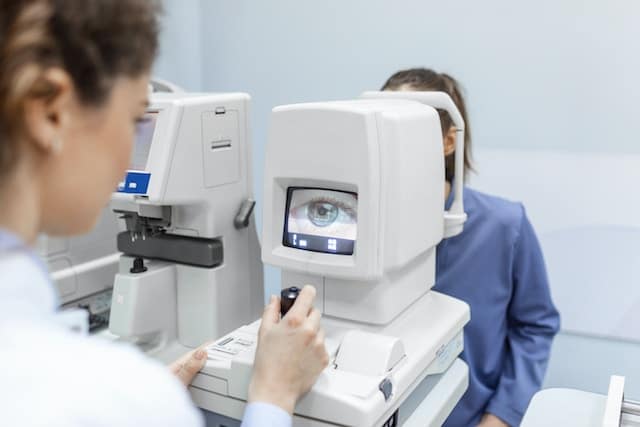As direct-to-consumer Alzheimer's tests become more widely available, experts warn: There are no laws to prevent disability and long-term care insurers from discriminating based on Alzheimer's risk and hiking their premiums.
Scientists are looking for ways to detect cognitive decline and Alzheimer’s faster, so that they can treat the disease sooner. This research involves discovering accurate biomarkers — like a protein, gene, or a marker on a digital cognitive test — that can theoretically predict a person’s chances of cognitive decline or Alzheimer’s. Some of these tests are already available, direct to consumer. But, a word of caution from researchers to anyone considering taking one: As of now, it is possible for insurers offering certain types of insurance — like disability or long-term care — to raise a person’s rates or deny them coverage because of these test results. The kicker: These tests are so new and have such high rates of false positives, the results might not be accurate, much less actionable.
Insurance companies discriminating based on your health history and health tests sounds like it shouldn’t be legal, but according to Claire Erickson, PhD, who researches medical ethics and health policy at the University of Pennsylvania, technically, it is. Health insurance is protected by law in the U.S. and Canada: Insurers can’t discriminate or refuse coverage. But so far, there are no laws that protect people who carry biomarkers of Alzheimer’s — genes like APOE4 or proteins like pTau-217 and pTau-181 — from many types of insurance discrimination.
As blood tests for Alzheimer’s become easier to access, even without a doctor’s prescription, Erickson said this could open the door for insurance companies to discriminate against patients.
“As it stands today, there are no protections for biomarker information [detected from] direct-to-consumer tests,” she told Being Patient. “It’s going to open a can of worms that I don’t think that we’re prepared for.”
Why genetic discrimination still matters for Alzheimer’s disease
Patients in the early stages of Alzheimer’s who want to take the anti-amyloid drug Leqembi might need to get tested for the APOE4 genetic variant to make sure they aren’t at risk of developing side effects like brain bleeds or brain swelling.
While there are US laws aimed at stopping genetic discrimination, they aren’t broad enough according to Hank Greely, a Stanford law professor who studies the ethics behind new technologies related to neuroscience and genetics.
In a Being Patient live talk, Greely explained that the US Genetic Information Non-Discrimination Act (GINA) of 2008 which was intended to provide protections fails in important ways.
“The act only deals with employment and health insurance, but it doesn’t deal with life insurance and probably most significantly for the Alzheimer’s community,” Greely said. “It doesn’t deal with disability insurance or long-term care insurance.”
Neurologists Dr. Madhav Thambissetty and Dr. Robert Howard, raised similar concerns in a joint op-ed published in the journal JAMA Neurology.
“APOE4 carriers are more than twice as likely to change their long-term insurance coverage than non-carriers,” they wrote. But if the company they want to switch to discovers that they carry these genes, they could face steeper premiums or be denied insurance even though there is a chance they may never develop Alzheimer’s disease.
In theory, the insurers could use the information about APOE4 status to determine whether or not they will provide long-term care coverage for a healthy individual in the future, they said.
And the effects might not stop with the person who took the test: APOE testing also inadvertently discloses the status of children and other family members, who could also be affected by insurance decisions later on in life.
Greely added that GINA only protects against genetic discrimination, adding that it doesn’t protect against “blood-based biomarkers, cerebral spinal fluid biomarkers, neuroimaging or anything else.”
What if I took a 23andMe test?
Several companies like 23andMe offer at-home testing for genetic biomarkers of Alzheimer’s disease like APOE4. GINA does not protect people who takes these tests from discrimination by disability or long-term care insurance companies, meaning that they can legally deny coverage based on the results of one of these tests.
Discrimination against protein biomarkers of Alzheimer’s
New blood tests might make it easier for doctors to screen for Alzheimer’s disease and, in conjunction with neurological testing, amyloid PET, and lumbar punctures, help diagnose Alzheimer’s disease.
But people can also take some of these blood tests even if doctors don’t suspect they’re at risk of Alzheimer’s. Quest Diagnostics makes these tests available to anyone over the age of 18 and has a few hundred dollars lying around. Currently, there aren’t any laws on the books in the US that prevent discrimination based on the levels of Alzheimer’s biomarkers in the blood.
According to Erickson, this information isn’t protected by health privacy laws either since Quest’s blood test is direct-to-consumer. That means the data could be shared with insurance companies that could use it to determine whether or not to provide certain kinds of coverage.
“Basically, your protections are whatever protections are included in the agreement with the company,” Greely explained. “Most of them want to be able to use your data for their own purposes.” This might involve sharing and selling the data.
Blood tests that are initiated by a doctor however, may be protected at least by health privacy laws. While insurance companies aren’t currently asking people to disclose their biomarker status, Erickson speculates that within five to 10 years, most insurers would want to know this type of information, especially as accessibility to biomarker testing continues to expand.
“A long-term care insurance company has a vested interest in knowing if you are at increased risk of developing Alzheimer’s or some other cause of dementia,” she said.
Erickson and other researchers are cognizant that there are now new ways to screen for and diagnose diseases, but legal protections usually lag behind. Only two countries in the world — Albania and Switzerland — had laws on the books that would at least prevent some biomarker based discrimination.
A 2023 research article authored by Erickson and her colleagues, on which Erickson was lead author, notes that “a GINA-like law for biomarkers would prohibit health insurers from discriminating on the basis of biomarker information.”
However, as of January 2024, Being Patient has not found any indication of pending proposals for such legislation.
“Scientific advancements typically far outpace the policy world,” Erickson said. “We’re trying to stay forward thinking and get the ball rolling on getting these protections.”




